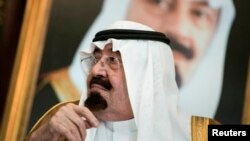Saudi Arabia's King Abdullah, a longtime U.S. ally in the fight against terrorism and Islamic extremism, died early Friday.
He was believed to have been 90 years old and had been ill for a long while.
His half brother, Prince Salman, will succeed him. Salman, thought to be 79, has been crown prince and defense minister since 2012.
Salman has called on the family's Allegiance Council to approve Prince Muqrin bin Abdulaziz as his crown prince and heir.
"His Highness Salman bin Abdulaziz Al Saud and all members of the family and the nation mourn the Custodian of the Two Holy Mosques King Abdullah bin Abdulaziz, who passed away at exactly 1 a.m. this morning," said a statement attributed to Salman.
President Barack Obama offered his personal condolences and the sympathies of the American people to the Saudi people and royal family. Obama said the king always was candid and had the courage of his convictions, including using the U.S.-Saudi relationship as a force for security and stability.
Abdullah officially ascended to the throne in 2006, but he had actually ruled since 1995, when his predecessor and half brother, King Fahd, suffered an incapacitating stroke.
Abdullah is believed to have been born in Riyadh in 1924 to an ultraconservative family in which the traditions and hospitality of Islam were always stressed.
As he grew into adulthood, oil was discovered in the Saudi desert and the country grew into the world's top oil exporter, bringing vast wealth to the royal family.
Upon taking control, Abdullah began unprecedented moves to modernize the conservative kingdom. Women were given a voice in politics and will be allowed to vote in local elections for the first time this year.
The king also established a Western-style university where students from both sexes openly mixed and shared classes. In addition, Saudi television and radio began broadcasting music that previously had been banned.
Abdullah was something of a maverick in his foreign policy. He proposed a peace deal in which Arab League states would recognize Israel if the Palestinians got their own state.
In a leaked U.S. diplomatic note, Abdullah urged the U.S. military to attack Iran and "cut off the head of the snake" to stop it from building a nuclear weapon.
Saudi Arabia is one of the top suppliers of arms to the rebels fighting to overthrow the Syrian government. It is a leading member of the U.S.-led coalition fighting against Islamic State forces in Iraq and Syria.
Saudi Arabia is also part of the G20 economic bloc and the World Trade Organization.
Despite reforms at home and moderation abroad, human rights groups continue to assail conditions in Saudi Arabia. They say women are still denied many basic rights.
The king refused to support the Arab Spring movements that toppled dictatorships in Tunisia, Egypt, Libya and Yemen.
Dissent is not tolerated, free speech is muffled and criminals still face extreme punishment such as beheadings.
Abdullah's successor, Salman, was governor of Riyadh province for five decades before becoming defense minister. By immediately appointing Prince Muqrin as his heir, Salman has moved to avert widespread speculation about the immediate path of the royal succession in the world's top oil exporter.





